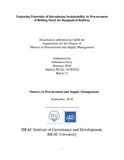Exploring potentials of introducing sustainability in procurement of rolling stock for Bangladesh Railway

View/
Date
2016-09Publisher
BRAC UniversityAuthor
Jerry, JebunnesaMetadata
Show full item recordAbstract
Sustainability issues should be addressed in designing, manufacturing and
vendor selection process in public transport sector. The vision of Bangladesh
Railway (BR) is to provide safe, reliable, cost-effective, and time-efficient
rail transport service in the country through modernizing, expanding, &
maintaining rail system in a manner which supports government strategies for
economic, social, & environmental development. To fulfill this vision, BR
has to procure rolling stocks i.e. Locomotives, Carriages, Wagons etc.
There are about 272 Locomotives, 1574 Passenger carriages and 6459
Wagons in the fleet of BR. However, most of these have passed economic
life and needs to be immediately replaced. Moreover, Traffic demand for
both Passenger and freight trains is increasing gradually as railway provides
safer, speedier, cost-friendlier mode of transport than other road transports.
For these two reasons BR is taking actions to procure various rolling stocks
through different projects. Currently 07 (seven) projects are ongoing in the
rolling stock department under financing of various development partners
conjugating total project cost amounting of BDT 1038441.25 Lakh. The
rolling stocks have an economic life of 20 (twenty) to 45 (forty five) years
depending on the category. So it is vital to make the procurement judiciously
and it can contribute a lot in ensuring sustainability. Hence this dissertation is
focusing on the issue of sustainability in procurement of rolling stocks, by the
Rolling Stock department of Bangladesh Railway.
The study specifically intended to identify current level of sustainability in
procurement, challenges faced in introducing sustainability and finally to
suggest ways to improve the level of sustainability in procurement of
Bangladesh Railway. The objectives of the study were achieved through two methods; firstly
studying practical cases of procurement of rolling stocks and secondly open
ended interviews with the officers of BR involved in procurement of rolling
stocks along with the representatives of development partners. All of these
were analyzed in the light of sustainable procurement performances. The
research work identifies the level of sustainable procurement as per the
flexible framework and the steps to be taken for improvement of the status.
Key steps to improve sustainable procurement status involves with the
preparation of sustainable procurement policy and successful implementation
of the policy to embed sustainability criteria in the procurement of rolling
stocks. Bangladesh Railway should give up the complacency of being an
environment friendly transport system and strive towards achieving
environmental, social and economical sustainability through sustainable
procurement.
